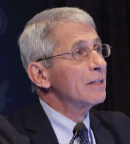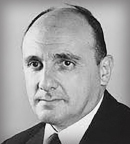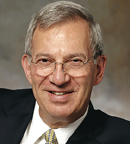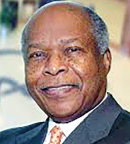The doctor-patient relationship, a time-honored tradition based on trust and cooperation, is critical for vulnerable patients, as they experience a heightened reliance on the physician’s competence, skills, and good will. That same trust is critical on the public health stage, when a nation is relying on sound medical stewardship in times of a health crisis.

Anthony S. Fauci, MD
Much of the United States is now turning to Anthony S. Fauci, MD, Director of the National Institute of Allergy and Infectious Diseases (NIAID) and a member of the White House Coronavirus Task Force, for guidance during the current pandemic. During his long and esteemed career in public health service, Dr. Fauci has played a significant role in the early 2000s in creating the President’s Emergency Plan for AIDS Relief and in driving the development of biodefense drugs and vaccines after the 9/11 terrorist attacks.
Building a Work Ethic
Born on December 24, 1940, Dr. Fauci was reared in southwest Brooklyn, where his parents ran a pharmacy below their apartment. His father was a pharmacist, known in the neighborhood as “Doc.” In an interview, Dr. Fauci recalled that the pharmacy was across from the Shrine Church of St. Bernadette; on Sundays after Mass, churchgoers would cross the street to pick up prescriptions and other items. His mother and sister would work the registers, as Dr. Fauci stocked shelves and made deliveries around the neighborhood on his bicycle.
His childhood was engrossed in the heyday of baseball, when the Brooklyn Dodgers and New York Yankees were bitter rivals. Even though a Brooklynite, Dr. Fauci was a devoted Yankees fan, leading to many spirited street-corner sports-talk battles.
Dr. Fauci went to Regis Jesuit High School, considered by many to be one of the finest all-boy schools in the country. Although a standout student and a whiz in science, Dr. Fauci had no early interest in pursuing a career in medicine. In fact, as captain of the Regis basketball team, he dreamed of one day going pro, but his 5 foot 7 inch stature proved a reality check. While his peers were heading to careers in medicine, engineering, and law, Dr. Fauci was steeped in family tradition from his mother’s side, all of whom were deep into the arts and humanities.
A Summer Job Inspires a Career in Medicine
After high school, Dr. Fauci went to the College of the Holy Cross in Massachusetts, where he excelled in biology and science. During the summer break, he worked construction jobs, one of which was at Weill Cornell Medical School on Manhattan’s Upper East Side.
After receiving his undergraduate degree, Dr. Fauci attended Weill Cornell Medical School, where he finished first in his class, earning his medical degree in 1966, a fateful year in the Vietnam War. During the graduation celebration, a recruiter from the Armed Services informed the graduates that every new male physician was required to perform some national service in the Army, Air Force, Navy, or Public Health Service. They were told to sign up and give their preferences. Dr. Fauci wanted to work for the U.S. Public Health Service and lucked out, ending up at the National Institutes of Health (NIH), where he has spent the past 5 decades.
A Valued Mentor
After completing his residency at Weill Cornell Medical School, Dr. Fauci was accepted as a research fellow at the NIH, where he worked in the laboratory of Sheldon Wolff, MD, Director of the NIAID. Dr. Fauci chose to work on Wegener’s granulomatosis, the severe and usually fatal type of vasculitis. At the time, Vincent DeVita, Jr, MD, was at the NIH, testing the immunosuppressors prednisone and cyclophosphamide to treat lymphomas and leukemias. Dr. Fauci and his mentor, Dr. Wolff, scoured the literature to see what might happen if they treated the inflammatory disease with low doses of the immunosuppressive drugs to inhibit the aberrant immune response.

Sheldon Wolff, MD

Vincent DeVita, Jr, MD
“It worked on the first few patients, and we began admitting more,” Dr. Fauci recalled. “Before you knew it, they all had dramatic remissions. We’d cured a lethal, albeit uncommon disease.”
AIDS Epidemic
Dr. Fauci’s career began to take shape, and he rose through the ranks, becoming Deputy Clinical Director of the NIAID in 1977 and Chief of the Laboratory of Immunoregulation. Then his first public health crisis appeared in the summer of 1980: reports of unusual illnesses—pneumocystis pneumonia and Kaposi’s sarcoma—in gay men from Los Angeles and New York City. Dr. Fauci noted he had a sinking feeling at the time, realizing these first cases might be something leading to a public health catastrophe. Of course, he was right; the HIV/AIDS epidemic was beginning to take hold.
Dr. Fauci and his colleagues revved up the research engines, working tirelessly and making several vital breakthroughs in understanding the odd and hugely destructive disease. In 1984, Dr, Fauci was given additional responsibilities as NIAID Director, which put him in the spotlight of the very public debate over how HIV/AIDS was being handled. It was during the Reagan administration, and Dr. Fauci was branded as someone who was purposely dragging his feet. Nothing could have been further from the truth.
In 1988, a group of AIDS demonstrators stormed the NIH campus, demanding quicker access to experimental drugs. Instead of calling in the security guards, Dr. Fauci invited the leaders to his office, where he listened and spoke. After that dramatic event, Dr. Fauci went to other areas, particularly San Francisco, to get real-world data and human experience about the disease that had ravaged entire communities.

Louis Sullivan, MD
Louis Sullivan, MD, Secretary of Health and Human Services during the first Bush administration, noted: “Anthony was someone who was really trusted by all the different organizations and people surrounding the AIDS challenge, ranging from the scientific community, the academic community, and the activist community.”
In an NIH interview, Dr. Fauci commented: “Understanding the mechanisms of cell entry of Kaposi’s sarcoma herpesvirus is a landmark achievement in and of itself. But the connection between the virus and expression of its own receptor on a cell is even more provocative, because it might change the way we think about Kaposi’s sarcoma herpesvirus–associated diseases and their treatment.”
A year later, in 1989, Dr. Fauci was asked to become Director of the NIH but declined. “If I took that job, it would have taken me one step further from what I really felt was the mission of what I wanted to accomplish, namely HIV/AIDS, get a vaccine, get better drugs, and prepare the country by developing countermeasures for biodefense,” he stated.
Within 20 years of working at the NIAID, Dr. Fauci helped to substantially increase the funding for the organization. He also worked with President George W. Bush to create the President’s Emergency Plan for AIDS Relief to address the HIV/AIDS pandemic in Africa. Thanks to his work, several million lives were saved throughout the world.
Facing a New Challenge
In January 2020, as reports of the novel coronavirus emerged from China, Dr. Fauci quickly assembled his research team to get to work on a vaccine. Within weeks, as the coronavirus began leaving a trail of casualties across other countries, he worked with colleagues at the Centers for Disease Control and Prevention to prepare the American public for what was soon to be recognized as a major global pandemic. Dr. Fauci has become the public face of the effort to combat the COVID-19 pandemic, giving measured assessments to hopefully guide the path forward and limit the death toll. “I encourage leaders to embrace facts, humane values, principled pragmatism, and noir realism as we face unprecedented global transformations,” he recently said.
Dr. Fauci, who has been known to log 80-hour workweeks, has received numerous awards for his accomplishments within the field of immunology and infectious disease, including the National Medal of Science for his scientific accomplishments in 2005. In 2007, President George W. Bush honored Dr. Fauci with the Presidential Medal of Freedom, the nation’s highest civilian honor, for his role in creating the President’s Emergency Plan for AIDS Relief.

